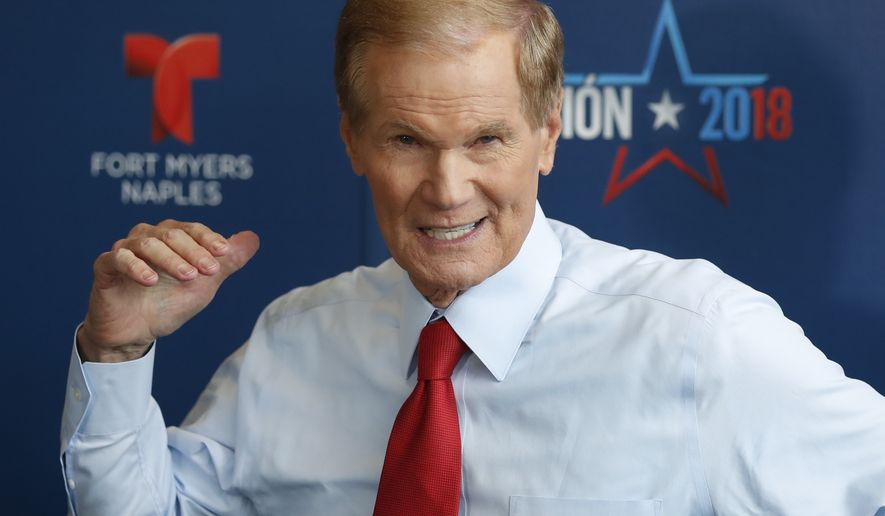The last thing people trying to pick up the shattered pieces after Hurricane Michael probably want to think about is politics, but politics has to be in the back of the minds of the officials sorting through the Florida wreckage.
Gov. Rick Scott, a Republican, toured the damage Monday with President Trump, while Sen. Bill Nelson, who Mr. Scott is challenging in the Nov. 6 election, is spending plenty of time in the Panhandle and the state’s Big Bend, the area where Michael smote Florida as a Category 4 hurricane with sustained winds of 155 mph.
“They are both experienced at this game and know how to walk this fine line,” said Steve Vancore, a Democratic political strategist in Tallahassee. “Although that’s easier for a sitting governor who has more actual on-the-ground duties than a United States senator. They have both done a good job of being present without being too political.”
Meanwhile, election officials were working to figure out the nuts and bolts of conducting the election.
Florida Secretary of State Ken Detzner visited election supervisors’ offices in five storm-ravaged counties and said they are working to ensure no one is disenfranchised by the calamity.
“The department is in regular communication with supervisors of elections in affected counties and they are still in the process of assessing potential damage to early voting and Election Day voting sites as well as any other impacts that could affect voters in their area,” he said.
The Panhandle traditionally has been a deeply conservative part of Florida, and some longtime political observers said Mr. Scott and the rest of the GOP statewide ticket could suffer.
“Yes, it will hurt Republicans more,” said Susan MacManus, a political science professor at the University of South Florida. “This part of the state is rural and always has high voter turnout, although many parts of it are sparsely populated.”
At a recent luncheon, Ms. MacManus said, a county supervisor of elections told her the surrounding counties have pitched in to lend voting equipment to the hardest-hit areas.
“That said, it still is not clear how many voters in those areas are deceased, in ill health, or otherwise negatively impacted such that voting is not a high priority,” she said.
Mr. Vancore, though, doubted the storm would make much difference in turnout.
“There will be voting places all over the place for early voting,” he said. “I don’t think it will affect the race in that respect.”
What it has done is thrown traditional campaigning off-kilter three weeks before the election.
Mr. Scott suspended his campaign shortly before Michael hit to concentrate on storm preparation and recovery, but the hurricane’s sudden intensification while swirling over the Gulf of Mexico meant it packed a much more powerful punch than anticipated, and now it’s unclear if Mr. Scott will be able to attend any campaign events before Nov. 6, according to a source close to the governor.
Monday offered a stark example of the different hats he is wearing.
He met President Trump and first lady Melania Trump at Eglin Air Force Base in Fort Walton and the trio then choppered to Mexico Beach, which was ground zero for the storm.
At the same time, the Scott campaign released a statewide television ad featuring Andy Pollack, whose daughter, Meadow, was one of the students slain last year during a gun rampage at Marjory Stoneman Douglas High School near Fort Lauderdale.
Mr. Nelson, meanwhile, has made several stops in the damaged zone.
The Nelson campaign also has been busy fundraising and drew heat in Michael’s aftermath when donation requests went out on his behalf from ActBlue, a nonprofit aimed at helping Democrats raise money through the internet.
Nelson campaign spokesman Dan McLaughlin sent an email to the media after Michael hit saying he had been fielding questions about upcoming debates and other activities but that “now is not the time to talk politics.” He said Mr. Nelson was focused on bringing federal resources into the state.
“I can say that Nelson is focused on doing his job and has been crisscrossing the Panhandle to meet with local officials and residents there,” said Jackie McGuiness, Mr. Nelson’s press secretary in his Senate office.
With the candidates tied up in one part of Florida, campaign events are largely being handled by surrogates. Florida first lady Ann Scott will be making many of the appearances her husband already had scheduled, according to the campaign.
Hurricanes were an issue in the campaign even before Michael appeared. Mr. Scott’s has displayed his ability to handle a crisis, as evidenced by his visible and aggressive relief work after Hurricane Irma battered southern portions of Florida in August 2017.
Less than two weeks later, Hurricane Maria hit Puerto Rico. Mr. Scott and Mr. Nelson have labored since then to court Puerto Rican voters, with Mr. Scott making eight trips to the island and Mr. Nelson stressing relief he was able to funnel to Puerto Rico from Washington.
• James Varney can be reached at jvarney@washingtontimes.com.




Please read our comment policy before commenting.